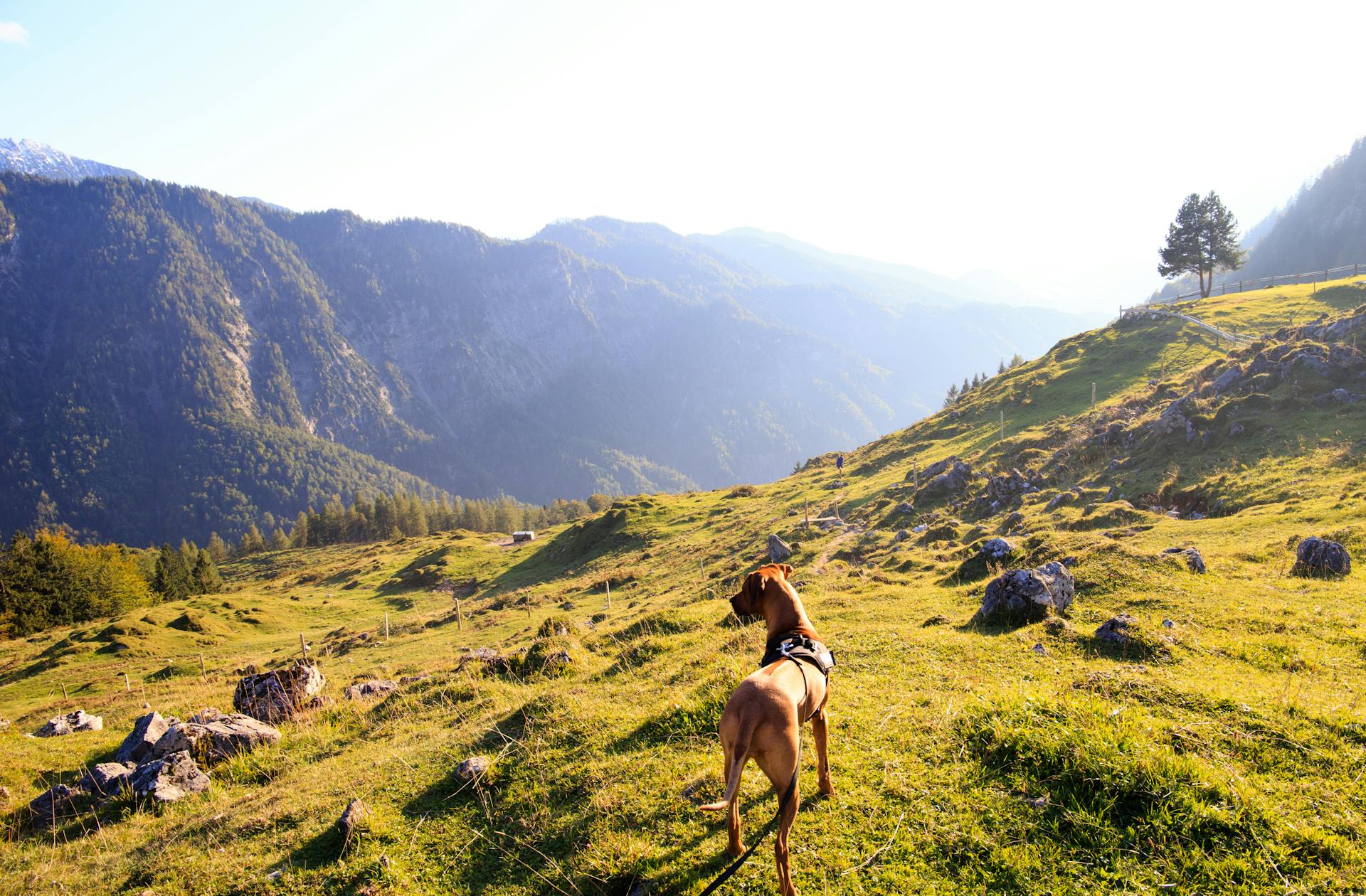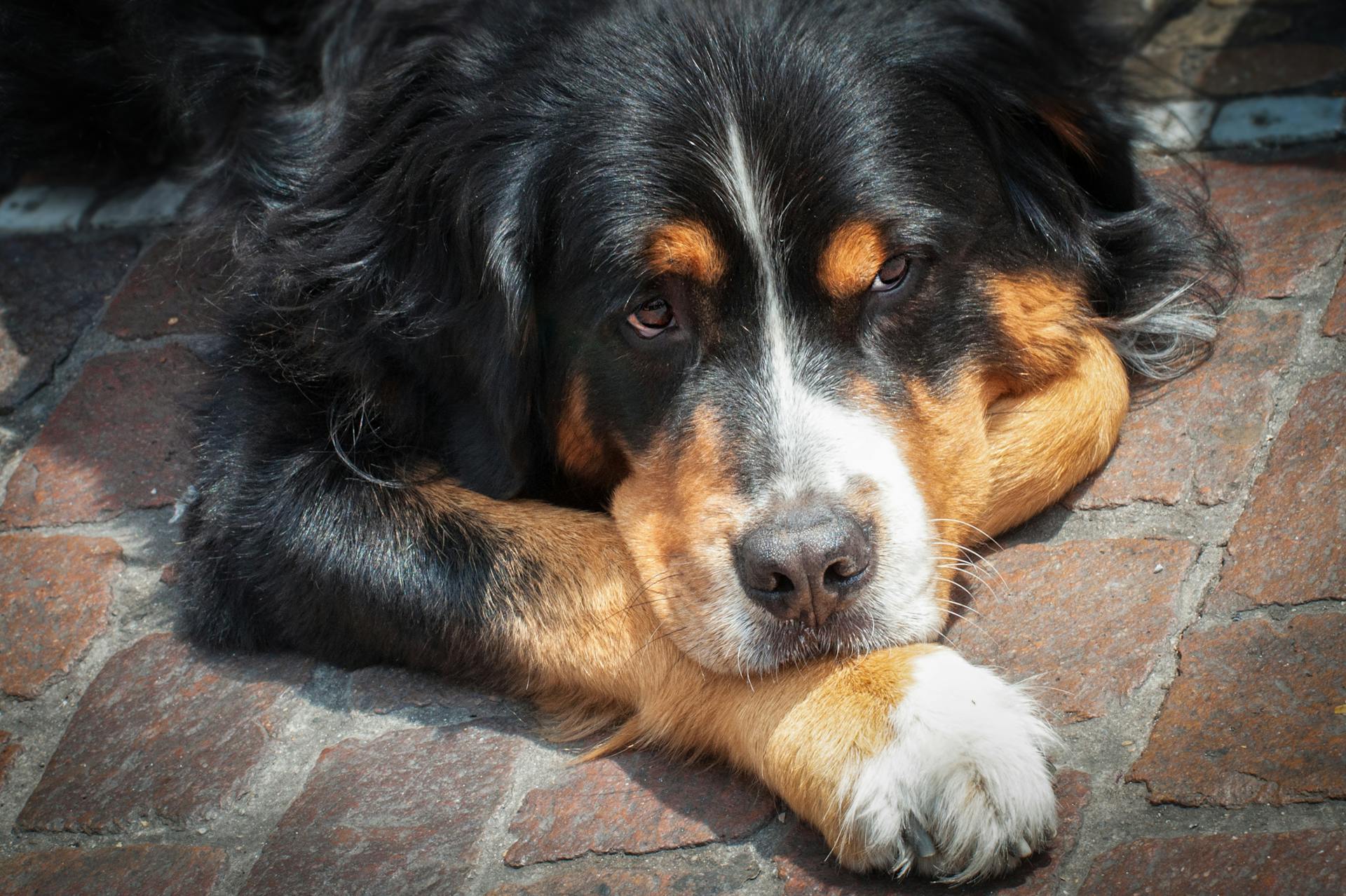
The Great Pyrenees is a majestic breed, but like all dogs, they can be prone to certain health issues. Hip dysplasia is a common problem in Great Pyrenees, which can lead to arthritis and mobility issues.
Regular exercise and a healthy diet can help prevent or manage hip dysplasia. However, some Great Pyrenees may still require surgery to alleviate pain and improve their quality of life.
Great Pyrenees are also at risk for certain eye problems, including cataracts and progressive retinal atrophy. These conditions can cause blindness and require prompt veterinary attention.
Proper care and regular veterinary check-ups can help identify eye issues early on, reducing the risk of long-term damage.
Here's an interesting read: Hip Dysplasia in Great Pyrenees
Common Health Issues
Great Pyrenees are generally a healthy breed, but like all dogs, they can be prone to certain health issues. They have an average lifespan of 10-12 years.
Gastric Dilatation and Volvulus, also known as bloat, is a serious condition that can be life-threatening if not treated promptly. It's a good idea to monitor your Great Pyrenees for signs of bloat, such as a swollen abdomen, restlessness, and difficulty breathing.
Brushing your Great Pyrenees' teeth daily can help prevent periodontal disease, which can cause bad breath, red gums, and even lead to more serious health problems. Regular dental care can make a big difference in your dog's overall health.
Some common health issues in Great Pyrenees include:
- Change in appetite or water consumption
- Tartar build-up, bad breath, red gums, or broken teeth
- Itchy skin (scratching, chewing, or licking), hair loss
- Lethargy, mental dullness, or excessive sleeping
- Fearfulness, aggression, or other behavioral changes
It's essential to be aware of these potential health issues and to monitor your Great Pyrenees for any unusual signs or symptoms. Regular check-ups with your veterinarian can help catch any problems early on and prevent more serious health issues from developing.
Obesity and Nutrition
Obesity can be a significant health problem in Great Pyrenees, causing or worsening joint problems, metabolic and digestive disorders, back pain, and heart disease.
It's tempting to give your pal food when she looks at you with those soulful eyes, but this can lead to obesity. Instead, give her a hug, brush her fur or teeth, play a game with her, or take her for a walk.
Great Pyrenees are prone to obesity, and it's essential to prevent it by feeding them a balanced diet and regular exercise.
To prevent obesity, it's best to feed your Great Pyrenees multiple small meals throughout the day, instead of one large meal.
A slow-feeder food bowl can also help slow down your dog as they eat, reducing the risk of gobbling down food quickly.
If your Great Pyrenees has growth disorders affecting their joints, joint supplements with glucosamine and chondroitin can help keep their joints healthy.
Omega-3 supplements, such as fish oil, can also aid in protecting joint health and keeping their skin and coat healthy.
Always talk to your veterinarian before giving your dog a supplement.
For Great Pyrenees that are prone to bloat and GDV, a gastropexy procedure can be a good option to discuss with your vet.
Here are some tips to prevent bloat and GDV in Great Pyrenees:
- Talk to your vet about a gastropexy procedure for your dog
- Feed your Great Pyrenees dog multiple small meals (two or three) throughout the day, instead of one large meal
- Avoid vigorous exercise around mealtimes
- Avoid raised food bowls
- Use a slow-feeder food bowl to slow your dog down as they eat
The right dog food can make a big difference in preventing obesity and other health issues in Great Pyrenees. Choose a high-quality dog food designed for large breeds, and consider your dog's current life stage (puppy, adult, or senior).
Bone and Joint Problems
Great Pyrenees are prone to a number of bone and joint problems, but with diligent observation and knowledge, you can take great care of your furry friend throughout his life.
Hip dysplasia is a common issue in Great Pyrenees, causing the joints to develop improperly and resulting in arthritis. Stiffness in the elbows or hips may become a problem as your Pyrenees matures.
Overweight dogs may develop arthritis years earlier than those of normal weight, causing undue pain and suffering. Keep your Pyrenees at a healthy weight to prevent this.
Osteochondritis dissecans, or OCD, is a problem that can occur when Pyrenees puppies grow too quickly. This causes the cartilage in their joints to not attach to the bone properly.
Feeding a large-breed puppy diet and sticking to a recommended growth rate of no more than four pounds per week can help prevent OCD.
Patellar luxation, where the kneecap slips out of place, can also occur in Great Pyrenees. You might notice your dog suddenly picks up a back leg and skips or hops for a few strides.
Additional reading: How to Prevent Twisted Stomach in Dogs
In mild cases, treatment beyond arthritis medication may not be necessary. However, surgery may be needed to realign the kneecap if symptoms are severe.
Eosinophilic panosteitis, or pano, is a painful inflammation of the long bones in the legs that can occur in growing Pyrenees. It usually starts at around six to ten months of age and shifts from leg to leg.
Pain medication is often required to manage the pain, and rehabilitation exercises may be necessary if your dog develops an abnormal gait to compensate for the sore leg(s).
Regular X-rays can help diagnose these conditions early on, and with proper treatment, your Great Pyrenees can live a happy and healthy life.
Consider reading: Dog Hemorrhagic Gastroenteritis Home Treatment
Cancer and Tumors
Cancer is a leading cause of death among dogs in their golden years, and unfortunately, your Great Pyrenees is more prone to certain kinds of cancer starting at a younger age.
Many cancers are curable by surgically removing them, and some types are treatable with chemotherapy.
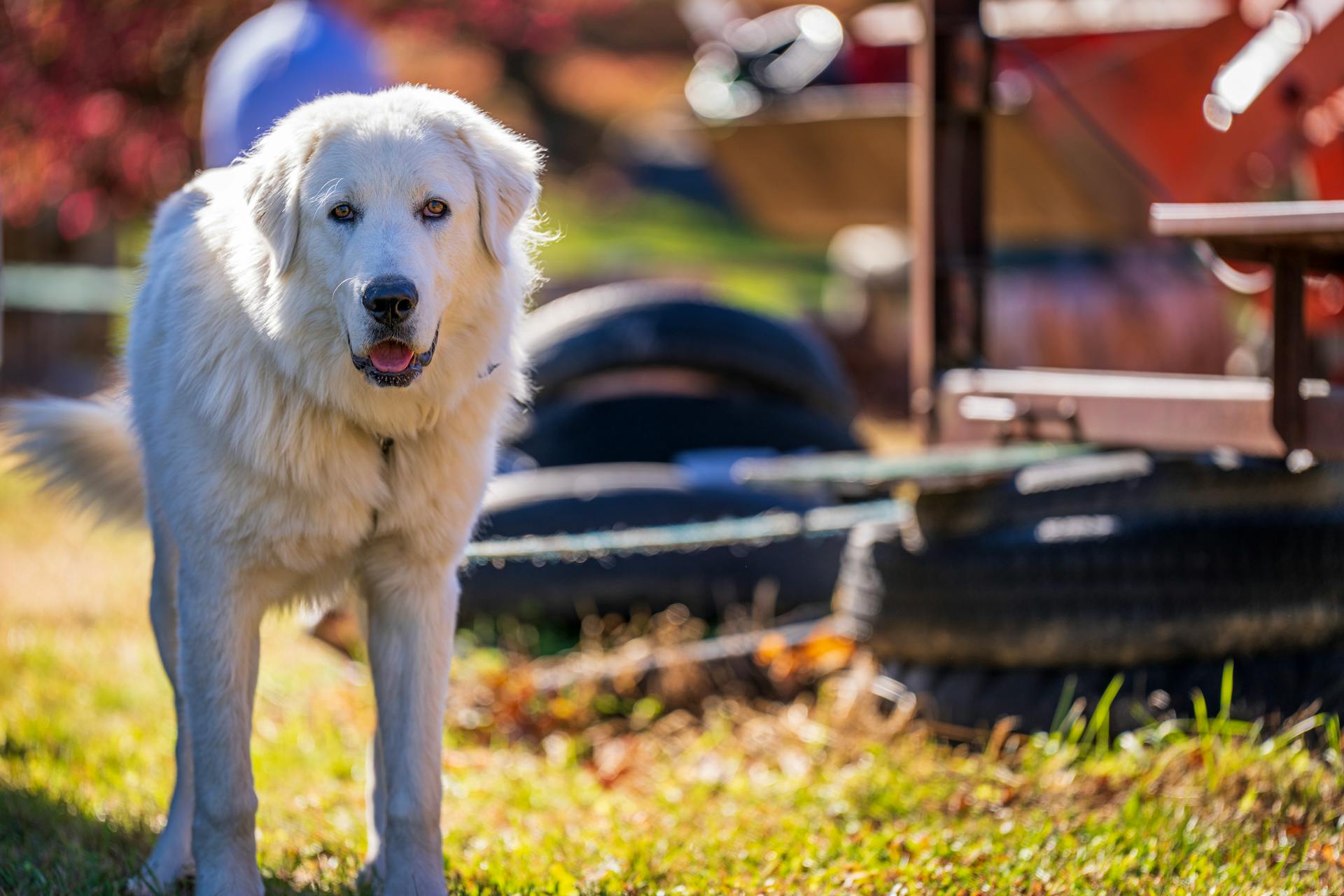
Early detection is critical, and we'll do periodic blood tests and look for lumps and bumps at each exam.
Osteosarcoma is the most common bone tumor in dogs, and it typically afflicts middle-aged large and giant breeds like your Pyrenees.
Early symptoms of osteosarcoma include lameness and leg pain, and if you notice your dog limping, call right away.
This is a painful and aggressive tumor, and the sooner it is removed, the better your dog's prognosis.
Readers also liked: Early Signs of Ivdd in Dachshunds
Heart and Kidney Issues
Great Pyrenees are generally very healthy dogs, but they can be born with a variety of heart defects that affect the structure of the heart's dividing wall or vessels.
These defects can also cause problems with the electrical signals that control the heartbeat or with heart valve function. Special testing will be recommended if a heart murmur is heard or unusual symptoms such as tiring easily, coughing, a swollen belly, or fainting are noticed.
Glomerulonephropathy is an inherited disease that slowly damages a Great Pyrenees' kidneys, causing them to fail often at an early age. Early detection is key, and yearly urine analysis can help diagnose this disease by testing for excessive protein in the urine.
Explore further: Can Dogs Sense a Heart Attack
Heart
Your Pyrenees can be born with a variety of heart defects that affect the structure of the heart's dividing wall or the vessels, or cause problems with the electrical signals that control the heartbeat or with heart valve function.
Some breeds, like your Pyrenees, are at a significant risk of heart disease, so it's essential to pay special attention to his heart during each examination.
Special testing will be recommended if you hear a heart murmur or notice any unusual symptoms such as tiring easily, coughing, a swollen belly, or fainting.
Heart murmurs can be a sign of underlying heart issues, and it's crucial to take action if you notice any unusual sounds when listening to your Pyrenees' heartbeat.
Your veterinarian will pay special attention to your Pyrenees' heart during each examination to catch any potential issues early on.
A swollen belly, or distended abdomen, can be a sign of heart disease in dogs, so keep an eye out for any unusual changes in your Pyrenees' body.
Here's an interesting read: Will a Hearing Aid Battery Kill a Dog
Kidney
Glomerulonephropathy is an inherited disease that slowly damages your Great Pyrenees' kidneys causing them to fail, often at an early age.
Yearly urine analysis is crucial for early detection, which leads to a happier pet and an easier, more affordable treatment plan.
Damaged kidneys leak protein, making it possible to diagnose this disease by testing your dog's urine for excessive protein.
A special diet may be recommended as part of the therapy plan to help manage the disease and improve your dog's quality of life.
Early detection is key, and regular check-ups can make all the difference in keeping your furry friend happy and healthy.
Dental and Oral Care
Dental and Oral Care is a crucial aspect of Great Pyrenees health. Brushing your dog's teeth regularly is essential to prevent dental disease, which affects 80% of all dogs by age two.
Great Pyrenees are more likely to have problems with their teeth, and if left untreated, can lead to infection of the gums and roots of the teeth, as well as damage to their kidneys, liver, heart, and joints. Regular dental care can help prevent these issues.
For more insights, see: How to Avoid Ivdd in Dachshunds
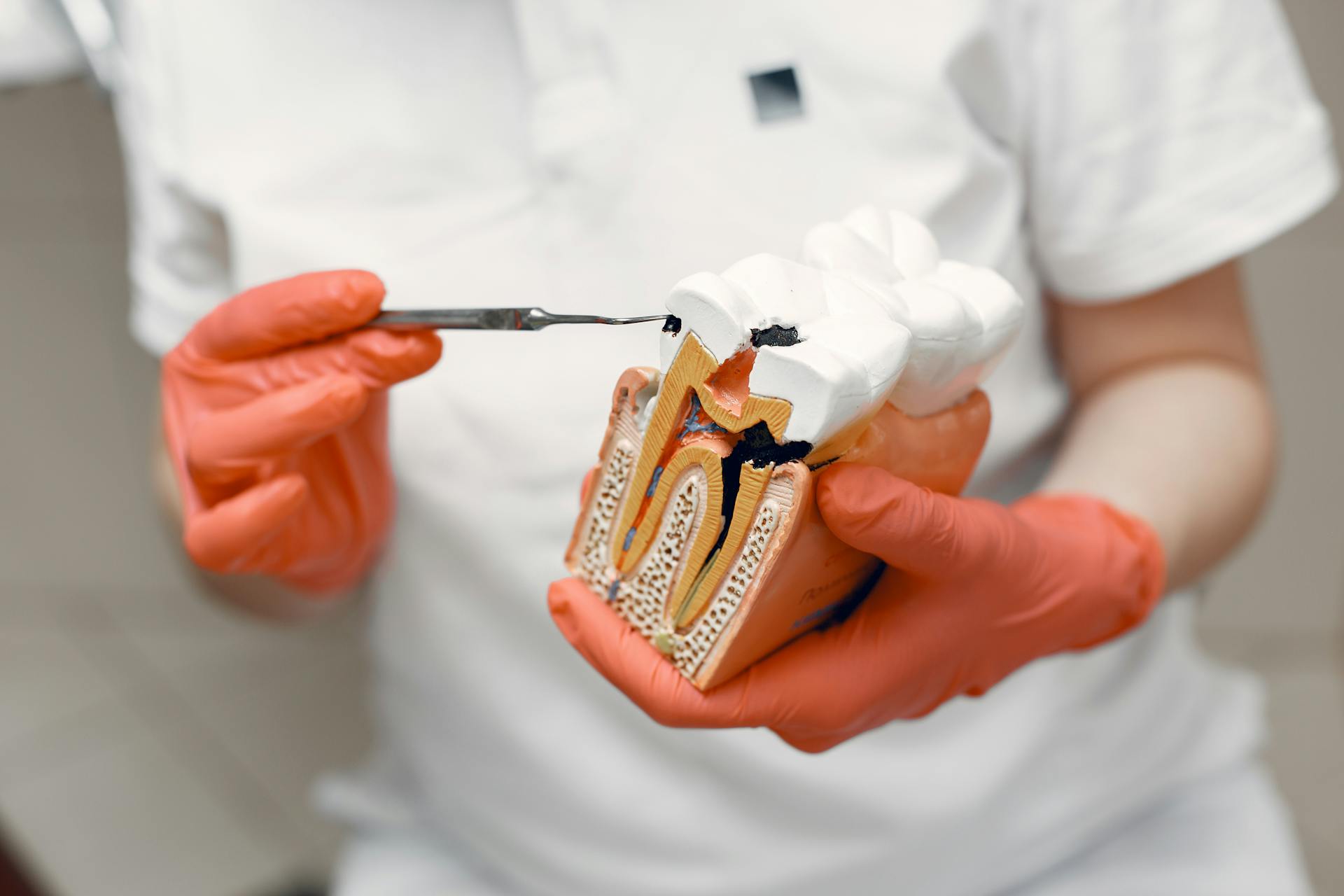
You can keep your dog's teeth perfect by brushing them at least twice a week. It's also essential to clean their ears weekly, even as a puppy. Here's a quick oral care checklist:
- Brush teeth at least twice a week
- Clean ears weekly
- Feed a high-quality diet appropriate for your dog's age
By following these simple steps, you can help keep your Great Pyrenees' teeth and overall health in top condition.
Dental
Dental care is crucial for your Great Pyrenees, as they are prone to dental disease. This common problem affects 80% of all dogs by age two, and your Pyr is more likely to have issues with her teeth.
Regular brushing is essential to prevent tartar build-up and infection of the gums and roots of the teeth. Brush your dog's teeth at least twice a week, and daily during shedding season when they blow their coat and lose a lot of hair.
Cleaning your dog's ears weekly is also important, but don't worry, you'll learn how to do it from your veterinarian. This will help prevent infections and keep your dog's ears healthy.
A fresh viewpoint: Great Pyrenees Ears
Here's a quick rundown of the importance of dental care for your Great Pyrenees:
By following these simple steps and being mindful of your dog's dental health, you can help prevent dental disease and keep your Great Pyrenees happy and healthy for years to come.
Take a look at this: Dental Health Diets for Dogs
Ear Care
Ear Care is a crucial aspect of your Great Pyrenees' overall health, and it's essential to prioritize it to prevent ear infections. Regular ear cleaning with a veterinary-approved ear cleanser is a must to maintain healthy ear canals.
You should clean your dog's ears weekly, even as a puppy, to prevent dirt and wax buildup. Cleaning ears is a simple process that can be done at home, and it's a great way to bond with your dog.
A Great Pyrenees blowing its coat can lead to excessive hair loss, so daily brushing is recommended during this time. Ear cleaning is also important during this period to prevent hair from getting stuck in the ear canals.
Worth a look: How to Prevent Diabetes in Dogs
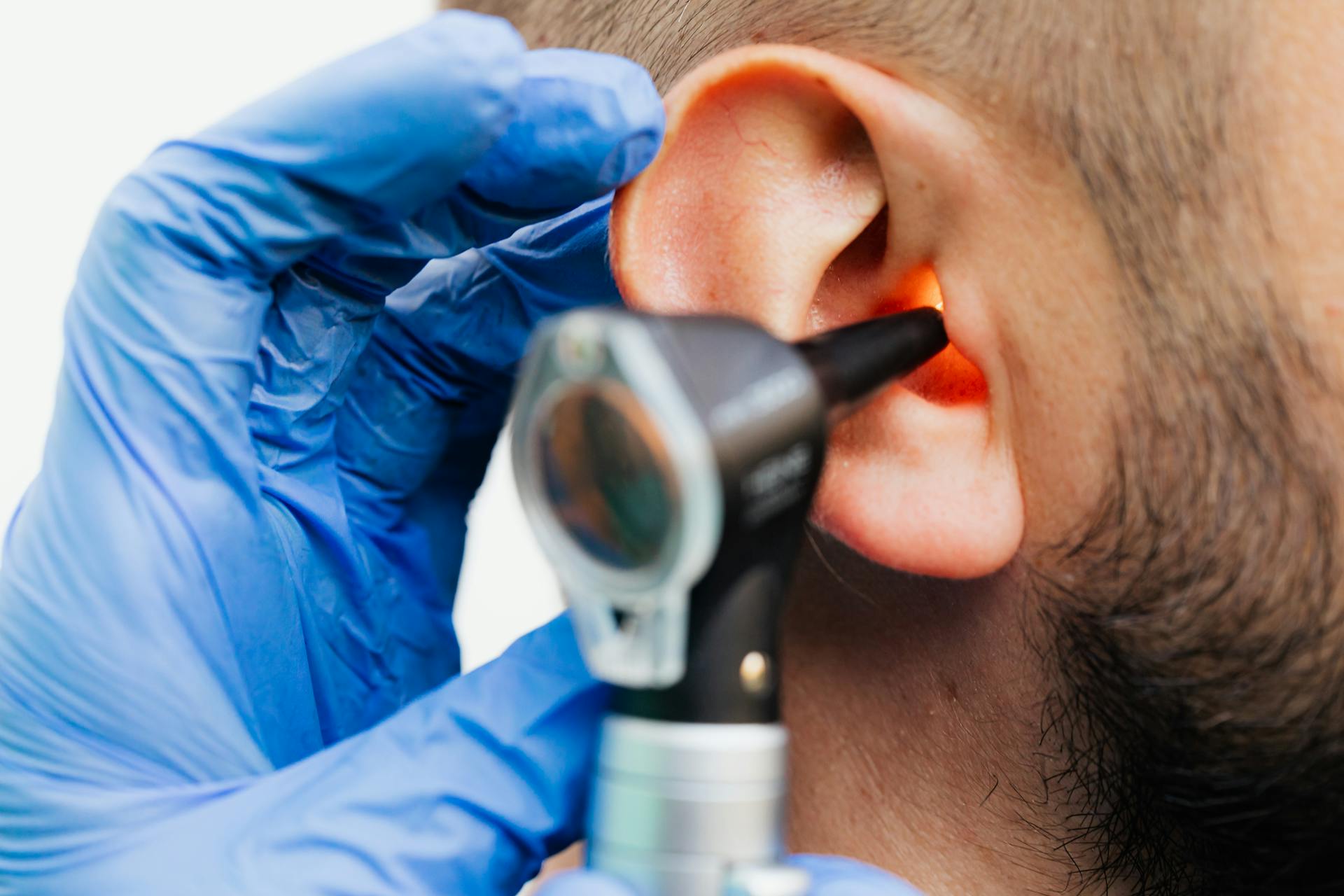
If your dog is prone to allergies, ear infections can be a common issue. Be sure to monitor your dog's behavior and watch for signs of ear infections, such as scratching, shaking, or a foul odor from the ears.
Here's a simple ear care routine to follow:
- Use a veterinary-approved ear cleanser and follow the instructions for use.
- Clean your dog's ears weekly, paying special attention to the ear canal and outer ear.
- Be gentle and avoid inserting the cleanser too far into the ear canal.
- After cleaning, dry the ears thoroughly to prevent bacterial growth.
Remember, regular ear care is key to preventing ear infections and maintaining your Great Pyrenees' overall health.
Bleeding and Digestive Disorders
Bleeding and Digestive Disorders can be a concern for Great Pyrenees owners.
Von Willebrand’s disease, a blood clotting disorder, is frequently found in Great Pyrenees.
This condition can lead to severe bleeding after injuries or surgery.
Infections
Great Pyrenees are susceptible to bacterial and viral infections, the same ones that all dogs can get, such as parvo, rabies, and distemper.
Many of these infections are preventable through vaccination, which will be recommended based on the diseases we see in our area, her age, and other factors.
Vaccination is a crucial step in protecting your Great Pyrenees from these preventable infections.
By getting your dog vaccinated on schedule, you can significantly reduce the risk of her getting sick with these diseases.
Explore further: Free Vaccination Clinic for Dogs
Parasites
Pyr's can be invaded by all kinds of worms and bugs, from fleas and ticks to ear mites, which can infest their skin and ears.
Some parasites, like hookworms, roundworms, heartworms, and whipworms, can get into a Pyr's system by drinking unclean water, walking on contaminated soil, or being bitten by an infected mosquito.
These parasites can cause pain, discomfort, and even death in Pyr's, making regular testing and preventive medication crucial to their health.
Some parasites can be transmitted to humans, posing a serious concern for everyone in the household.
Bleeding Disorders
There are several types of inherited bleeding disorders that occur in dogs, ranging in severity from very mild to very severe.
Many times a pet seems normal until a serious injury occurs or surgery is performed, and then severe bleeding can result.
Von Willebrand's disease is a blood clotting disorder frequently found in Great Pyrenees.
We'll conduct diagnostic testing for blood clotting time or a specific DNA blood test for Von Willebrand's disease or other similar disorders to check for this problem before we perform surgery.
Intriguing read: Skin Disorders Dachshunds
Gastric Dilatation-Volvulus
Gastric Dilatation-Volvulus is a severe form of bloat that can affect any deep-chested breed, including the Great Pyrenees.
This condition can happen when a large amount of food and gas builds up in the stomach, causing the stomach to expand and potentially twist, cutting off blood flow to important organs.
If you notice a distended abdomen, retching without producing any vomit, or general signs of abdominal pain, such as standing and stretching, seek immediate veterinary care.
Excessive drooling is also a sign of GDV, which can be a life-threatening condition.
Many deep-chested dogs undergo a gastropexy surgery to help prevent GDV, often when they are spayed or neutered.
Curious to learn more? Check out: Symptoms of Twisted Stomach in Cats
Neurological Disorders
Degenerative Myelopathy is a serious neurologic condition that affects Great Pyrenees more frequently than other breeds.
It causes weakness and poor nerve function in the hind legs, leading to paralysis and incontinence. Rehabilitation, exercise, acupuncture, and dietary supplements can be helpful, but there is no cure.
A genetic test is available to determine whether your dog is at risk for this heritable disease.
Neuronal degeneration (NDG) is an inherited disease that causes degenerative changes to the entire nervous system, including the brain, spinal cord, and peripheral nerves.
Clinical signs typically begin when Great Pyrenees puppies are less than 1 year old and may be mild, such as stumbling or dragging a paw.
The condition will progress until the dog is no longer able to stand or walk on their own.
Care and Management
To keep your Great Pyrenees happy and healthy, it's essential to establish a routine care schedule. This includes regular brushing, which should be done at least weekly, with daily brushing recommended during shedding season.
A proper diet is also crucial, and it's best to feed a high-quality diet suitable for your dog's age. Consistency is key, so avoid giving your dog people food and stick to a consistent feeding schedule.
Supervising your pet is also vital, especially in the early stages. Keep doors closed, pick up after yourself, and block off rooms as necessary to prevent your dog from getting into trouble. This will help prevent unwanted behavior and keep your dog safe.
Here are some essential tasks to include in your routine care schedule:
- Supervise your pet as you would a toddler
- Brush your dog's teeth at least twice a week
- Clean your dog's ears weekly
- Exercise your dog regularly, but avoid overexertion
Care and Lifestyle
Caring for a Great Pyrenees is a big responsibility, but with the right routine, you can help your furry friend live a happy and healthy life. Supervise your pet as you would a toddler, keeping doors closed and picking up after yourself to keep her out of trouble.
Keeping your Great Pyrenees' coat clean is crucial, especially during shedding season. Brush her thoroughly at least weekly, and daily during peak shedding months. This will prevent matting and tangling, and reduce the amount of loose hair around the house.
Great Pyrenees generally have good teeth, but regular brushing is still essential. Brush her teeth at least twice a week to keep them perfect. This will also help prevent bad breath and gum disease.
Recommended read: How to Keep Great Pyrenees on Property
Cleaning your dog's ears is a simple task that should be done weekly, even as a puppy. Make sure to clean the outer ear and ear canal, but avoid inserting anything into the ear canal itself.
A Great Pyrenees' diet is just as important as her exercise routine. Feed a high-quality diet appropriate for her age, and keep her diet consistent to prevent digestive issues. Avoid giving her people food, as this can lead to an unbalanced diet and potentially harmful health problems.
Regular exercise is also crucial for your Great Pyrenees. Keep her mind and body active with regular walks, playtime, and training sessions. However, don't overdo it at first – Great Pyrenees are large and energetic dogs, and they need time to build up their endurance.
Here's a quick rundown of the daily tasks you should perform to keep your Great Pyrenees happy and healthy:
- Brush her coat at least weekly, and daily during peak shedding months
- Brush her teeth at least twice a week
- Clean her ears weekly
- Feed a high-quality diet appropriate for her age
- Exercise her regularly, but don't overdo it at first
By following these simple tasks and routines, you can help your Great Pyrenees live a long, happy, and healthy life.
What to Watch
Taking care of your Great Pyrenees requires attention to detail and a watchful eye. Any abnormal symptom could be a sign of serious disease, or it could just be a minor or temporary problem.
Regular check-ups and vaccinations are crucial to prevent diseases and conditions common in Pyrenees. Be sure to adhere to the schedule of examinations and vaccinations that your veterinarian recommends.
Changes in your dog's behavior or physical condition can be a clear signal that she needs help. Keep an eye out for signs of illness, such as a change in appetite or water consumption.
Here are some specific things to watch for:
- Change in appetite or water consumption
- Tartar build-up, bad breath, red gums, or broken teeth
- Itchy skin (scratching, chewing, or licking), hair loss
- Lethargy, mental dullness, or excessive sleeping
- Fearfulness, aggression, or other behavioral changes
Remember, many diseases cause dogs to have a characteristic combination of symptoms, which together can be a clear signal that your Great Pyrenees needs help.
Emergencies and Prevention
As a Great Pyrenees owner, it's essential to be aware of the potential health issues that can arise in these magnificent dogs. Scratching or shaking the head, tender ears, or ear discharge are all warning signs that require immediate medical attention.
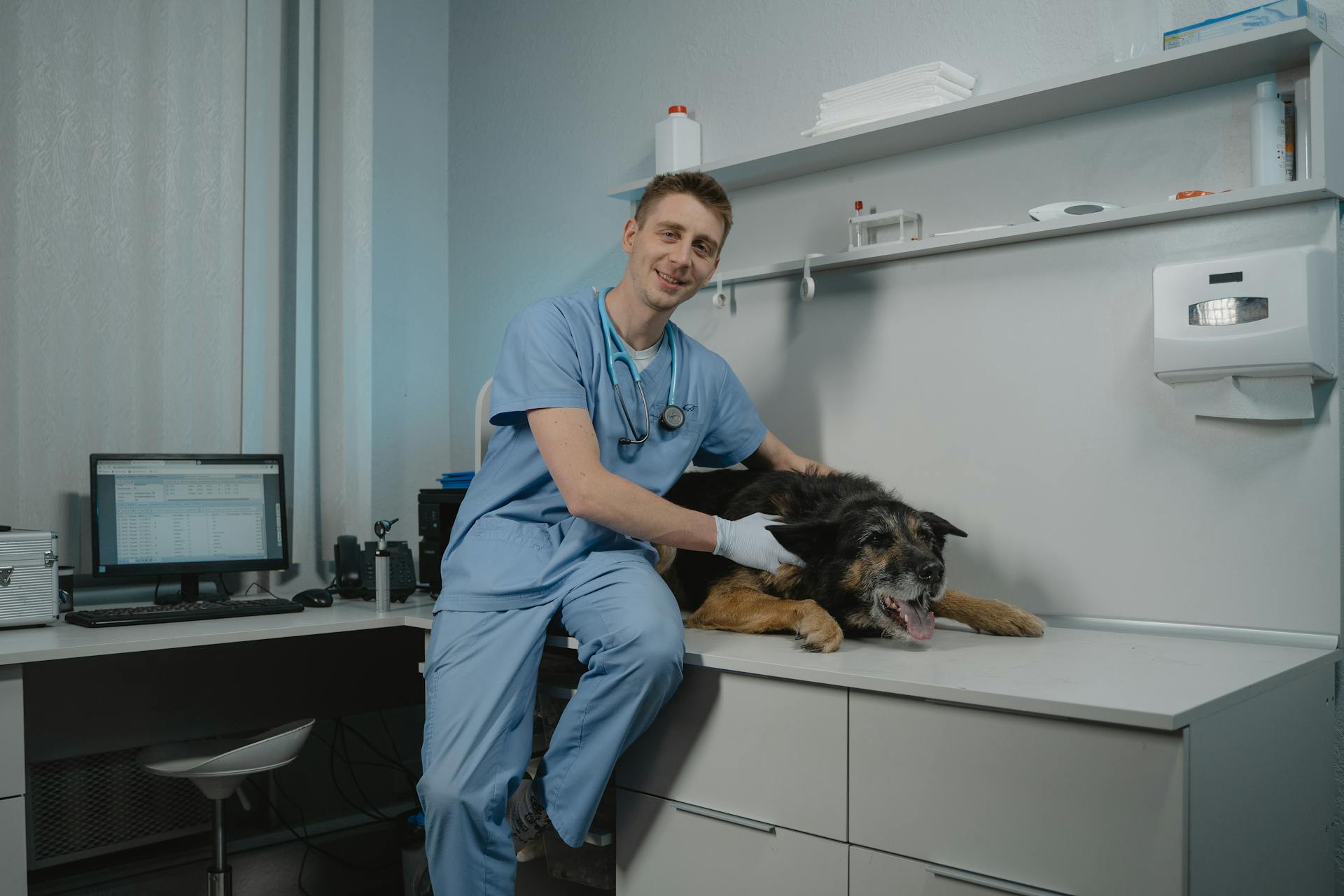
Some common signs of illness in Great Pyrenees include inability or straining to urinate, discolored urine, cloudiness, redness, itching, or any other abnormality involving the eyes. These issues can be caused by a range of factors, including infections or other underlying health problems.
Dry heaving or a large, tight, painful abdomen can be a sign of gastrointestinal issues, such as bloat or gastritis. If you notice your dog exhibiting these symptoms, it's crucial to seek medical care right away.
Great Pyrenees are known for their love of activity, but if you notice your dog is reluctant to run or play, it may be a sign of underlying health issues. This could be due to a range of factors, including joint problems or respiratory issues.
Here are some common signs of illness in Great Pyrenees that require immediate medical attention:
- Scratching or shaking the head, tender ears, or ear discharge
- Inability or straining to urinate; discolored urine
- Cloudiness, redness, itching, or any other abnormality involving the eyes
- Dry heaving or a large, tight, painful abdomen
- General reluctance to run or play
- Tiring easily, coughing, a swollen belly or fainting/collapse
- General listlessness, droopy facial expression, vomiting, diarrhea
- Dragging the hind toes and hind limb weakness
- Leg stiffness, reluctance to rise, sit, use stairs, run, jump, or “bunny hopping”
Spay or Neuter
Spaying or neutering your Great Pyrenees is one of the best things you can do for their health. It decreases the likelihood of certain types of cancers and eliminates the possibility of your pet becoming pregnant or fathering unwanted puppies.
Spaying or neutering surgery involves surgically removing the ovaries and usually the uterus in females, and the testicles in males. This surgery can be done at the same time as other procedures that may be beneficial for your dog, such as hip X-rays or a puppy tooth extraction.
Routine blood testing prior to surgery helps identify and take precautions for common problems that increase anesthetic or surgical risk. Don't worry, your veterinarian will discuss the specific problems they will be looking for when the time arrives.
Additional reading: Will a Great Pyrenees Attack an Intruder
Allergies and Sensitivities
Allergies to pollen, mold, or dust can make Pyrenees' skin itchy, a condition known as atopy. This is a common issue in Pyrenees, especially between the ages of one and three.
The feet, belly, folds of the skin, and ears are most affected by atopy in Pyrenees. These areas tend to be itchy and uncomfortable for the dog.
Symptoms of atopy can get worse every year, making it essential to monitor your Pyrenees' health closely. Licking the paws, rubbing the face, and frequent ear infections are common signs of atopy.
Fortunately, there are many treatment options available for atopy in Pyrenees, offering hope for a more comfortable life for these beautiful dogs.
Frequently Asked Questions
What is the most common cause of death in Great Pyrenees?
The leading cause of death in Great Pyrenees is cancer, which can strike at a relatively young age. Early detection and treatment are crucial for improving survival rates in this breed.
Sources
- https://camillusanimalclinic.com/client-resources/breed-info/great-pyrenees/
- https://riversideveterinary.com/client-resources/breed-info/great-pyrenees/
- https://magnoliavethospital.com/client-resources/breed-info/great-pyrenees/
- https://www.animalhealthcenternjwc.com/client-resources/breed-info/great-pyrenees/
- https://www.petmd.com/dog/breeds/great-pyrenees
Featured Images: pexels.com
